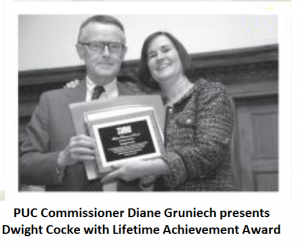California lost one its most historically important anti-nuclear activists on the night of of April 27th when Dwight Cocke passed away at his long term residence in San Francisco. Dwight played the key role of getting proposition 15 on the statewide ballot in 1976 that stopped all further expansion of nuclear power in California. His role in bringing the nuclear issue up for public debate was the first time in America if not the world. In the 1960’s, California was held up as a world leader in promoting nuclear energy with Pacific Gas & Electric Co. (PG&E) calling for the construction of up to 60 reactors in its own territory, but due to prop 15 ended up leading the world away from nuclear and into renewable energy development.
Dwight was one of the two staff people with Californians for Nuclear Safeguards that coordinated the 1976 California statewide proposition 15 initiative. Thanks to Dwight’s coordination, the group setup a statewide network of thousands of volunteers that obtained the 500,000 signatures needed to put it on the statewide June ballot. The initiative campaign made national news when three General Electric engineers quit to form MHB Associates. PG&E and pronuclear advocates were so frightened by Prop 15 that the company agreed with alternative legislation that banned any future nuclear power development in California until there was a working solution for spent nuclear fuel.
The legislation’s ban led to General Electric’s San Jose nuclear headquarters being closed and the abandonment of nearly 30 nuclear stations being planned at that time in the state. The group then took on the giant $4.8 billion nuclear project that was fronted by PG&E for the L.A. Dept. of Water and Power located near Bakersfield in Kern County. Dwight coordinated the campaign against the 1978 Kern County nuclear permit advisory ballot initiative (it included a door to door county wide canvass) that voted down the proposed 4 units by a whopping 70%. In 1983, PG&E contested the legislation banning further nuclear development to the U.S. Supreme court but failed. Many other states would enact similar legislation that played a major role in limiting new reactor development.
In 1981-2 Californians for Nuclear Safeguards (CNS), with secret legal aid from Gov. Jerry Brown developed a new ballot initiative that would have forever closed the state’s nuclear operations without ever using the word nuclear but just on economic grounds. The bill was timed to hit just as PG&E was to announce massive rate increases. Dwight was CNS’s coordinator for the plan. The ballot initiative was ready for submission to the state registrar when Dwight received a call from Harold Willens who had taken over planning for the 1982 Sane Freeze nuclear weapons California initiative. Willens, who had been the head of former president LBJ’s marine corps was determined to make sure that only one anti-nuclear issue would be on the ballot that year. Willens told Dwight that he would use his connections to block funding from the Beverly Hills people that Dwight was planning to ask for seed money for the nuclear power initiative. Heart-broken, Dwight came back and informed the tiny core staff that the project would be canceled after over a year of work.
Dwight would also become executive director for the first Fate of the Earth Conference held in 1982. Dwight also coordinated the Sept. 11th, 1986 satellite Spacebridge tel-conference between Moscow, San Francisco and the east coast with top scientists from the two countries for Esalen’s Russian exchange program. He was also a director of the Oakland based Russian-American joint medical exchange program called Heart-to-Heart.
To read more about Dwight’s history please see chapter Five and Six of Marc Evanoff’s unpublished book on the history of California’s anti-nuclear movement from 1981.
 In later years, Dwight worked for the consumer watchdog organization called TURN (The Utility Reform Network) who gave him their Lifetime Achievement Award in 2009 during their 35th anniversary celebration. TURN monitors the activities of the California Public Utilities Commission.
In later years, Dwight worked for the consumer watchdog organization called TURN (The Utility Reform Network) who gave him their Lifetime Achievement Award in 2009 during their 35th anniversary celebration. TURN monitors the activities of the California Public Utilities Commission.
Dwight once told me that during the early 1970’s when he first started working against nuclear power he would routinely be called a communist by nuclear proponents in public. His fearless dedication and work that created the first public debate ever around the dangers of nuclear energy played a key role in it being phased out in California and for this he should be remembered as one of our most important activists.
Dwight William (Jr.) was born in 1937 to Dwight and Florence Ziegelasch in Washington DC.
A memorial is planned for July.
